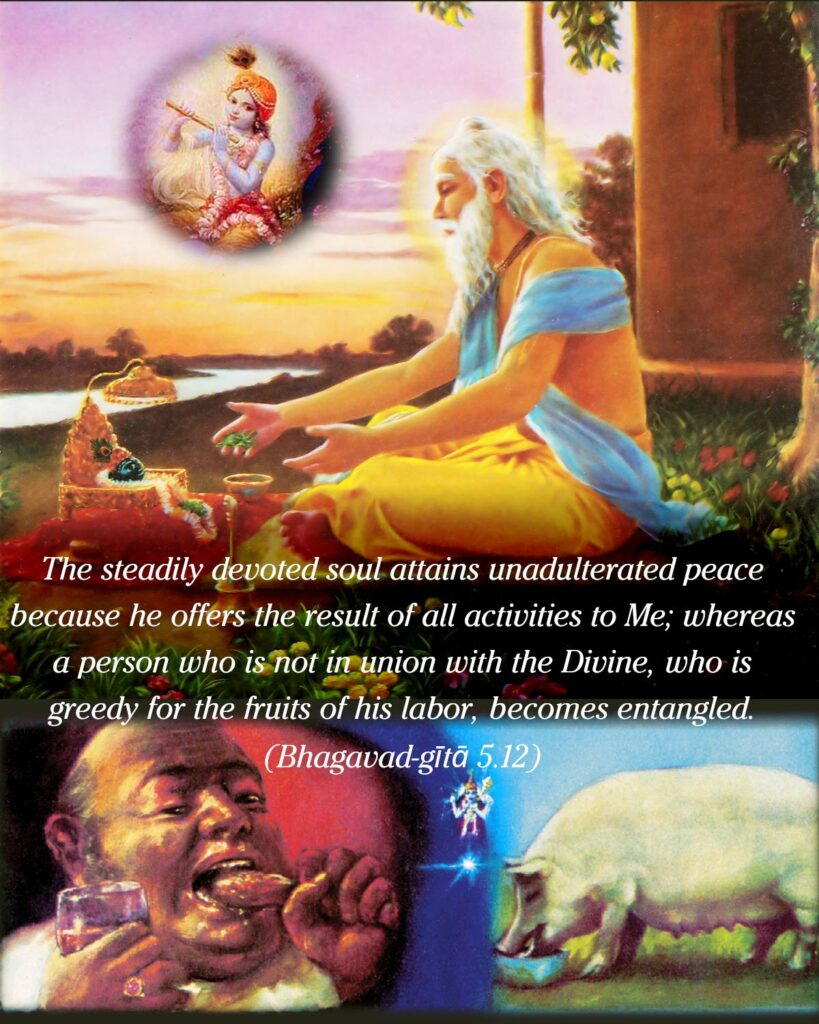युक्त: कर्मफलं त्यक्त्वा शान्तिमाप्नोति नैष्ठिकीम् |
अयुक्त: कामकारेण फले सक्तो निबध्यते || 12||
yuktaḥ karma-phalaṁ tyaktvā śhāntim āpnoti naiṣhṭhikīm
ayuktaḥ kāma-kāreṇa phale sakto nibadhyate
yuktaḥ—one who is united in consciousness with God; karma-phalam—the results of all activities; tyaktvā—giving up; śhāntim—peace; āpnoti—attains; naiṣhṭhikīm—everlasting; ayuktaḥ—one who is not united with God in consciousness; kāma-kāreṇa—impelled by desires; phale—in the result; saktaḥ—attached; nibadhyate—becomes entangled
Translation:
The harmonised yogi, abandoning the fruits of action attains final peace, while the non-united one impelled by desire for the fruits of action is bound.
Commentary:
The harmonised yogi attains eternal peace because he is free from desire and attachment. The non-integrated man suffers bondage because his actions are impelled by a desire for enjoyment. Freedom is attained by desirelessness, bondage is caused by desire. The perfected karma yogi enjoys the eternal peace of Brahman and the Jnana yogi also enjoys the peace of the Eternal. Peace, supreme peace, is the goal of the two types of yoga. Both lead to Self-realisation.
Peace is the direct result of non-attachment. All the restlessness, frustration, ill-will, hatred, and struggle are caused by attachment to worldly objects and thirst for pleasures. When the yogi discovers higher joy in Atma untainted by any disturbing factors, he finds no relish for the lower pleasures of the material world. And this non-attachment leads to supreme peace. So the aspirants should analyse the cause of suffering in the world, and when he analyses the problem, he would naturally find out that the attachments are the root cause for all the storms and tempests in their minds. Give up desire and attachment, peace is yours – This is the Lord’s message.
Swami Vivekananda Says —
We read in the Bhagavad Gita again and again that we must all work incessantly. All work is by nature composed of good and evil. We cannot do any work which will not do some good somewhere; there cannot be any work which will not cause some harm somewhere. Every work must necessarily be a mixture of good and evil; yet we are commanded to work incessantly. Good and evil will both have their results, will produce their karma. Good action will entail upon us good effect; bad action, bad. But good and bad are both bondages of the soul. The solution reached in the Gita in regard to this bondage-producing nature of work is that, if we do not attach ourselves to the work we do, it will not have any binding effect on our soul.[Source]
Sri Ramakrishna Says —
MASTER: “Shall I tell you the truth? What will you gain by mere scholarship? The pundits hear many things and know many things — the Vedas, the Puranas, the Tantras. But of what avail is mere scholarship? Discrimination and renunciation are necessary. If a man has discrimination and renunciation, then one can listen to him. But of what use are the words of a man who looks on the world as the essential thing?
“What is the lesson of the Gita? It is what you get by repeating the word ten times. As you repeat ‘Gita’, ‘Gita’, the word becomes reversed into ‘tagi’, ‘tagi’ — which implies renunciation. He alone has understood the secret of the Gita who has renounced his attachment to ‘woman and gold’ and has directed his entire love to God. It isn’t necessary to read the whole of the Gita. The purpose of reading the book is served if one practises renunciation.”
DR. SARKAR: “A man once explained the meaning of Radha to me. He said to me: ‘Do you know the meaning of Radha? Reverse the word and it becomes “dhara.” That’s the meaning.’ (All laugh.) Well, let us stop here for today.” (Source: Gospel of Sri Ramakrishna)
Question: What is the fruit of Nishkama Karma and why?
Answer: The peace of the Eternal is the fruit and the reason for it is non-attachment.
Question: What is the fate of the man of desire and why?
Answer: He is bound by the wheel of samsara and the reason is desire.
Question: What then is the cause of liberation and bondage?
Answer: Non-attachment is the cause of liberation, and attachment is the cause of bondage.
Question: What is the way to supreme peace?
Answer: Desirelessness.
Bhagavad Gita: Chapter 5 🔻 (29 Verses)
